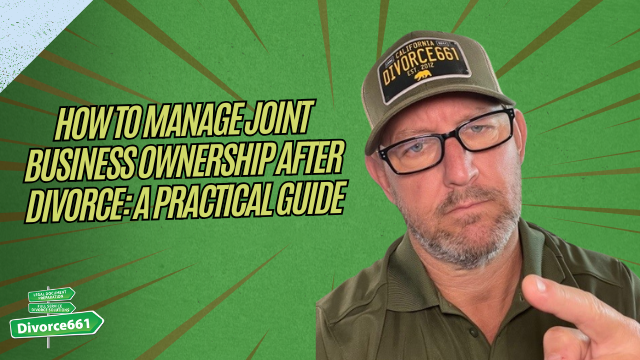How to Manage Joint Business Ownership After Divorce: A Practical Guide
Going through a divorce is challenging enough, but when you and your spouse co-own a business, the complexities multiply. Understanding how to fairly value, divide, or continue running a shared business post-divorce is crucial for protecting your financial future and maintaining stability. Drawing on insights from Tim Blankenship of Divorce661, this guide breaks down the essential steps to managing joint business ownership after divorce, with real-world examples and practical advice.
Why a Professional Business Valuation Is Essential
One of the first and most important steps after divorce is obtaining a professional business valuation. This isn’t just about looking at your income statement or profits. A thorough valuation examines the full picture, including:
- Assets and debts
- Goodwill and brand value
- Future growth potential
Knowing the true worth of your business lays the foundation for informed decisions, whether you’re considering a buyout, selling the business, or continuing as co-owners. A fair valuation acts as your guiding light, helping you make choices that align with your financial and personal goals.
Exploring Your Options Post-Divorce
When it comes to managing a business with your ex-spouse, there are three primary paths you can take:
- Buyout: One partner purchases the other’s interest in the business, gaining full ownership.
- Co-ownership: Both parties continue to own and operate the business together.
- Sale: The business is sold, and proceeds are divided between the parties.
Each option comes with unique implications. Buyouts require careful negotiation and financing. Co-ownership demands clear communication and updated legal agreements. Selling may be the simplest financial solution but could mean giving up a valuable asset. Understanding these options helps you select the best path forward.
The Importance of Updating Legal Agreements
If you choose to co-own the business post-divorce, it’s critical to revisit and update your operating agreements. Clearly defining roles, responsibilities, and decision-making authority helps prevent conflicts and ensures smooth daily operations.
Legal documents should address:
- Who manages what aspects of the business
- How profits and losses are shared
- Procedures for resolving disputes
- Exit strategies for future changes in ownership
Having these details spelled out in writing protects both parties and supports business continuity.
A Real Client Success Story: Co-Owning with a Gradual Exit
Consider the example of a couple who co-owned a marketing firm. Instead of selling or forcing an immediate buyout, they decided to remain business partners temporarily. One spouse planned a gradual exit over two years.
The keys to their success included:
- Clearly defined roles that matched each partner’s strengths
- A written, mutually agreed-upon plan outlining the exit timeline
- Open and ongoing communication maintaining a shared vision
This approach allowed the business to remain stable and profitable throughout the transition, preserving the company’s integrity and their professional relationship.
How Divorce661 Supports Post-Divorce Business Ownership
At Divorce661, we specialize in helping clients fairly value and divide business interests during divorce. Our collaborative approach includes working closely with legal and financial professionals to:
- Update ownership documents and operating agreements
- Develop clear post-divorce business plans
- Navigate the complexities of buyouts, co-ownership, or sales
Our goal is to empower you to move forward confidently, whether you’re buying out your ex, continuing as partners, or selling the business. With remote, flat-fee services available throughout California, we make expert guidance accessible and straightforward.
Take the Next Step with Confidence
Managing joint business ownership after divorce can feel overwhelming, but you don’t have to do it alone. Understanding your business’s true value, exploring your options, and updating legal agreements are crucial steps toward securing your financial future.
If you’re unsure about how to proceed, visit Divorce661.com for a free consultation. Together, we can build a clear, actionable plan tailored to your unique situation and help you navigate the road ahead.
“A fair valuation can be your guiding light. Whether you’re considering a buyout, continued ownership, or a sale, understanding your business’s true worth is the first step in planning your next move.” – Tim Blankenship, Divorce661

